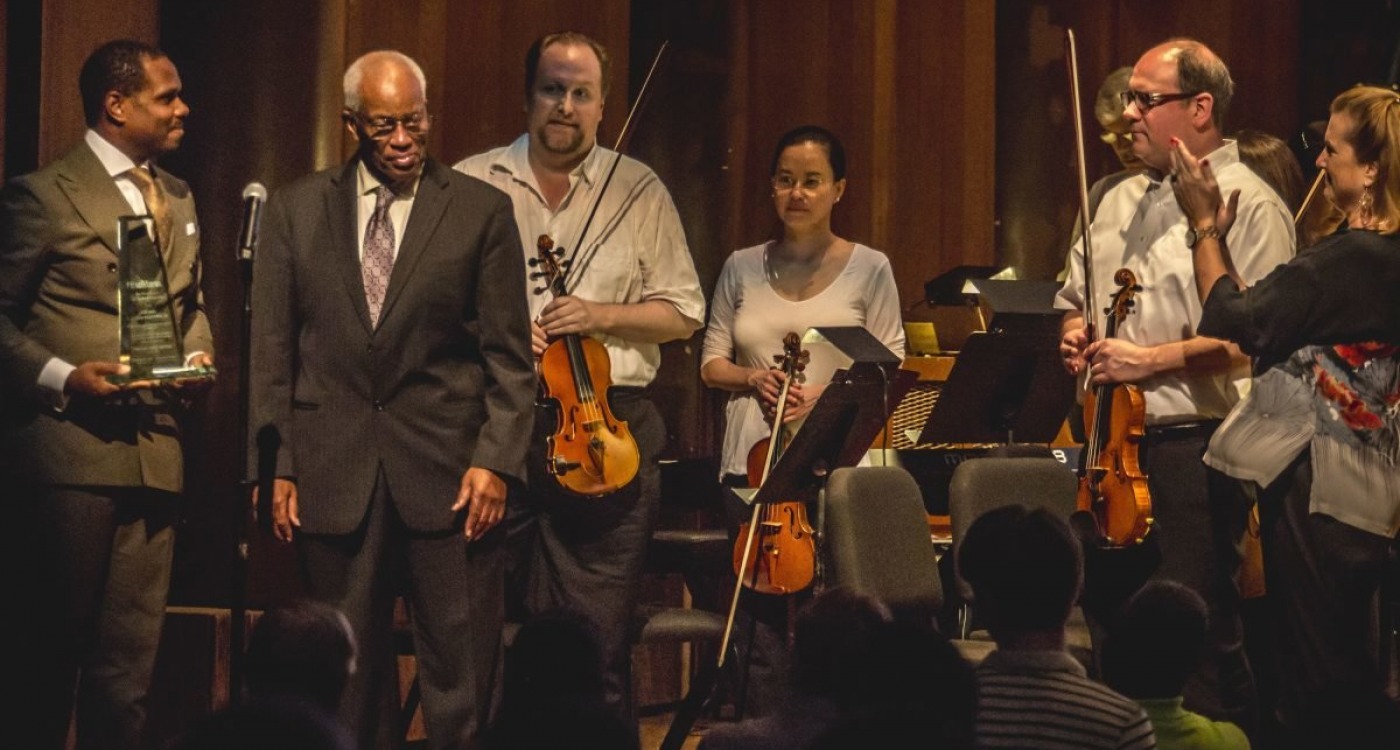Philly astronaut Bluford gets his props at the Mann - and a soaring orchestral number in his honor

JULY 26, 2017
From Richard Strauss to Haydn, John Williams to Puccini, and with a stop at a lovely new commission, Tuesday night’s Philadelphia Orchestra concert moved fast. But then again, space travel is like that.
The concert, dubbed A Space Odyssey, was this summer’s centerpiece artistic statement at the Mann Center. Composer Nolan Williams Jr. was commissioned by the Mann to write a new piece honoring astronaut Guion Bluford Jr. — Philadelphia-born and the first African American in space.
Bluford took the stage briefly, telling the Mann crowd that “it was an honor to be back, and I take a great deal of pride in being a Philadelphian.” More moving perhaps were the moments of localized spontaneous applause at intermission as the astronaut walked up the aisle through the house.
If the Mann and Williams succeeded in anything Tuesday night, it was in creating a vibe of warmth and quiet awe. Something about the vastness of space brings people close — perhaps a visceral sense of existential perspective. Footage from Bluford’s Space Shuttle missions reminded us of the feats of science and technology in space, while the music, at various points, made hearts leap at the more poetic implications of humans’ moving through the cosmos. Williams, who’s also the Mann’s festival artistic director, surrounded his new song cycle with orchestral works — all led by conductor Cristian Macelaru — that referenced, to one extent or another, some celestial element.
Musically, it was a bit of a jumble. The move from “Dawn,” from Strauss’ Also sprach Zarathustra (known to many for its use in 2001: A Space Odyssey), to Haydn’s “The Heavens Are Telling” from The Creation might have made sense on paper, but in practice, it was jarring. Works did sometimes speak to one another in unexpected ways, though. Would we have noticed the sly Strauss references in “Adventures on Earth,” an astonishingly colorful swath from John Williams’ score to E.T., had the concert not begun with Strauss’ famously bright sun rays of brass?
You didn’t need to understand the text about the “silvery moon in the velvet night” in Dvorak’s “Song to the Moon” from Rusalka: It was all right there in the silvery orchestrations, and in the velvet soprano voice of Elena Perroni. She was joined by the light tenor of Marco Cammarota in the “Balcony Scene” duet from Bernstein’s West Side Story.
Less subtle were the images of planets, moons, and solar flares projected on the big screen as the orchestra played the “Jupiter” movement from Holst’s The Planets. It was all too literal, and distracting.
The evening’s best moments were the ones that got at some emotion, and there were several that went right to the heart. Even now, 35 years later, John Williams’ music from E.T. startles with its beauty and directness. It brings propulsive energy and sparkly space dust, with stretches of tenderness and deep humanity. The orchestra played with a great polish that journeyed from heroic to introspective and back again.
Nolan Williams Jr. had big forces at his disposal for Hold Fast to Dreams: the Mann Festival Choir drawn from local groups, two excellent soloists — soprano Leah Hawkins and bass-baritone Frank B. Mitchell 3d — plus the clarion narration of Franklin Institute astronomer Derrick Pitts. With various texts, including some from Bluford, the piece’s four movements mixed and matched forces in canny ways to explore dreams — dreams stirred and realized, and dreams dashed.
Williams has a musical language all his own. It brims with vernacular American optimism, but is always in service to the text. Pitts’ narration over a jazz band cool breeze in the second movement caught Langston Hughes’ sense of language perfectly, with Williams’ giving a “broken-winged bird” more hope than the poetry itself by assigning the image an oboe figure that persisted in trying to take flight.
Williams’ gift for warmth glowed in the last song. In “Hope Renewed: Child of the Universe,” Hawkins took on the tone of maternal authority, assuring, with Max Ehrmann’s words, that the “world is beautiful still.” Williams’ dreamily upbeat piece left no other choice than to believe it so.
Read the full article at Philly.com